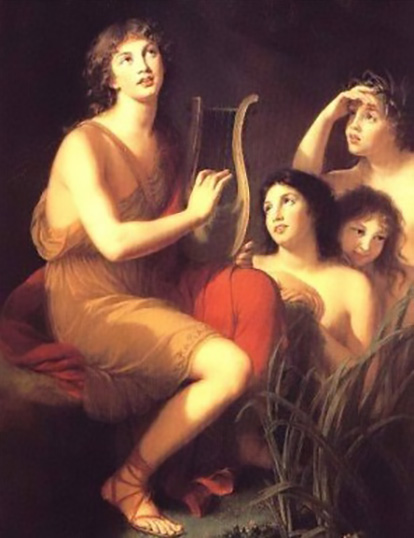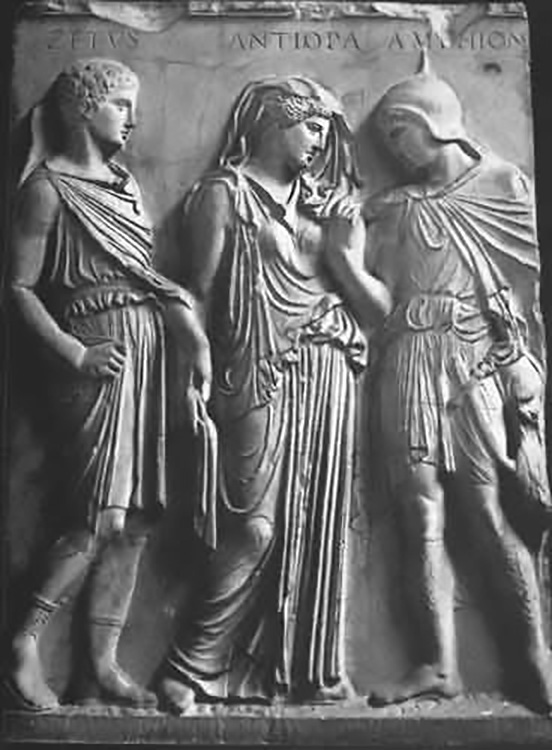Zethus
In Greek mythology Zethus was a king of Thebes, for he co-ruled the city founded by Cadmus with his twin brother Amphion.
ZETHUS SON OF ZEUS
Zethus was a son of Zeus in Greek mythology, for he, and his twin brother Amphion, were conceived when Zeus slept with Antiope whilst disguised as a Satyr.
This mating would occur in the city of Cadmea, as Thebes was then known, but Antiope, was the daughter of the regent Nycteus, and fled from the city in shame at her pregnancy (although some say she was abducted by King Epopeus of Sicyon).
ZETHUS AND AMPHION ABANDONED
Antiope would be retrieved from Sicyon by Lycus, the brother of Nycteus, but when Antiope gave birth to two boys on the return journey, Lycus ordered that they be exposed upon Mount Cithaeron, believing that they were sons of Epopeus.
Zethus, and his brother Amphion, of course did not die of exposure, for they were rescued by a shepherd, who raised them as his own.
Zethus would grow highly skilled in animal husbandry, and cattle and sheep in his care would always prosper, whilst Amphion developed musical skills. Zethus and Amphion would often argue about the merits of their skills, each arguing that theirs had more worth.
ZETHUS AND AMPHION MARCH ON CADMEA
When in early adulthood, Antiope discovered that her sons were still alive and discovered them still living upon Mount Cithaeron. Zethus and Amphion would then be told all that had gone before, and the twin brothers also discovered just how badly Antiope had been treated in Cadmea, by Dirce, the wife of Lycus.
Zethus and Amphion would march upon Cadmea, and Dirce was killed; some tell of Zethus and Amphion killing Lycus as well, though others tell of Lycus being sent into exile. In either case, Zethus and Amphion decided to become co-rulers of Cadmea, usurping the rule of Laius, who should have been king, and Laius too was sent into exile.
ZETHUS AND AMPHION BUILD THE WALLS OF THEBES
Under Zethus and Amphion Cadmea grew in size, expanding outwards from the original citadel, and the twin sons of Zeus were credited with having built up the defensive walls of the city.
It was said that whilst Zethus toiled away carrying stones, Amphion simply played music, but this music managed to move the large stones into place. Zethus and Amphion were also said to have built the seven gates of Thebes, and the seven associated towers.
ZETHUS MARRIES
Zethus and Amphion would find themselves appropriate partners, with Amphion marrying Niobe, daughter of Tantalus.
Some call the wife of Zethus Thebe, potentially a daughter of Asopos, although others claim that Thebe was simply another name for Antiope, and instead most name the wife of Zethus as Aedon, a daughter of King Pandareus of Ephesus. Though, it was in the time of Zethus and Amphion that Cadmea became known as Thebes.
THE DEATH OF ZETHUS
Aedon would bear Zethus a son, Itylus, but Aedon became increasingly jealous of Niobe, her sister-in-law, for Niobe had born to Amphion seven sons and seven daughters.
Aedon would thus decide to kill the eldest son of Amphion and Niobe, but through some dreadful mistake, Aedon ended up killing her own son, Itylus. Zeus would transform Aedon into a nightingale, who even today, continues to sing her laments over her lost child.
Zethus would kill himself when he learned of his wife’s actions, and the death of his son, leaving Amphion as sole ruler of Thebes, if but for a short time.
Zethus was said to have been buried in a simple mound tomb, one which became a joint tomb with Amphion, upon the death of the twin brother of Zethus.
The tomb of Zethus and Amphion was noted by Pausanias, for the geographer told of how the people of Tithorea believed that the earth of the tomb had the ability to grant bountiful harvests. So each year Tithoreans would try to steal some earth, whilst the people of Thebes would seek to guard it, to prevent their own harvest from being damaged.

Sources
Pseudo-Apollodorus, Bibliotheca 3.5.5
Roman, L., & Roman, M. (2010). Encyclopedia of Greek and Roman mythology., p. 58, at Google Books
Tripp, Edward. Crowell's Handbook of Classical Mythology. New York: Thomas Crowell Company, 1970, p. 44. Original, less elaborate, account in Pausanias, Graeciae Descriptio 6.20.18
Tripp, Edward. Crowell's Handbook of Classical Mythology. New York: Thomas Crowell Company, 1970, p. 43
Tzetzes, Chiliades 1.13 line 322
Gantz, Timothy. Early Greek Myth. Baltimore: Johns Hopkins University Press, 1993, p. 539
Homer, Odyssey Trans. Richmond Lattimore. New York: Harper Collins, 1967, p. 295
Pausanias, Description of Greece
"Greek Legends and Myths"













